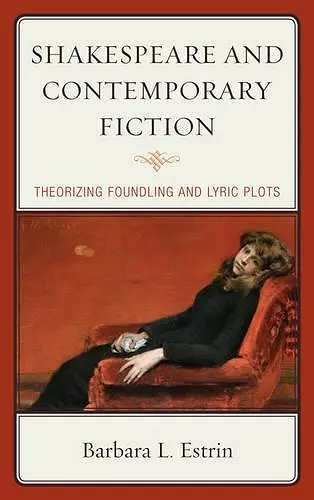Shakespeare and Contemporary Fiction
Theorizing Foundling and Lyric Plots
Format:Hardback
Publisher:University of Delaware Press
Published:23rd Nov '11
Currently unavailable, our supplier has not provided us a restock date

In the first book to use fiction as theory, Barbara L. Estrin reverses chronological direction, beginning with contemporary novels to arrive at a re-visioned Shakespeare, uncovering a telling difference in the stories that script us and that influence our political unconscious in ways that have never been explored in literary-critical interpretations. Describing the animus against foreign blood, central to the dynamic of the foundling and lyric plots that form the nexus of her study, Estrin describes how late modern writers change those plots. Reading backward through the theoretical lens of their revisions allows us to rethink the Shakespeare we thought we knew. That innovative methodology, in turn, encourages us to read forward again with different tellings, ones that challenge the mythological homogeneity of the traditional classifications and that suggest new formulaic paradigms. With close readings of four contemporary novels and three Shakespeare plays, Estrin identifies the cultural walls that contribute to political gate-keeping as she chronicles the connection between plot variations and gender revisionism in the work of Caryl Phillips, Liz Jensen, Anne Michaels, and W.G. Sebald, as well as two film-makers (Mona Hatoum and Mieke Bal) who demonstrate an understanding that mythical repercussions prove dangerous in the twentieth and twenty-first centuries even as they suggest how the heritage shaping their work, and to which they are themselves drawn, in turn proposes an alternative Shakespeare, one who frees us to ask other questions: At the time that the nation state was beginning to coalesce, what does Shakespeare’s frequent use of the foundling plot and his significant variations portend? How does his infusion of a revised lyric dynamic in The Merchant of Venice, Othello and The Winter’s Tale change our reading of plays where the two plots coalesce as they do in the contemporary novels that shape Estrin’s late modern interpretations? All the works in this study share the underlying premise that the connection between cultural origins and political destinies is reciprocal and that it is necessary and possible to transform the constructs—in memory and imagination—that continue to shape our lives.
This inspired, bold, and moving book argues for Shakespeare's role in contemporary fiction's speculative and ethical work. Arguing that Shakespeare brings together the foundling narrative and the Petrarchan love lyric, Estrin shows how these two traditions share an investment in purity of blood, and in the appeal of a fantasy of freedom from responsibility. Her advances in thinking about how temporality works in narrative and drama are most impressive. -- Theresa Krier, Macalester College
Comprehensive in its grasp, Barbara Estrin's Shakespeare and Contemporary Fiction is a carefully researched, clearly reasoned, and densely argued blending of literature, fairy tale, and Holocaust history, which shows the interdependence of many genres in the evolution of a universal plot. -- Robert Brustein, Harvard University
Estrin (emer., Stonehill College) explains in her preface that she will closely explore the reciprocal "intersection between the foundling and Petrarchan plots in contemporary fiction and Shakespeare's plays." She begins with Caryl Phillips's The Nature of Blood, Liz Jensen's Ark Baby, W. G. Sebald's Austerlitz, and Anne Michael's Fugitive Pieces, contemporary novels that, she writes, "pave the way for rethinking the Shakespeare we thought we knew." Estrin then looks back to Shakespeare's The Merchant of Venice, Othello, and The Winter's Tale (with nods to other Shakespeare plays) and in the afterword considers various films, different genres that encode the large mythological and political influences of gender and race. Estrin certainly offers a new and original approach to Shakespeare; her study is carefully researched, as her chapter-end notes attest. That said, she addresses a specialized audience, and many will most likely struggle with the at times dense, tedious, and arcane prose. Estrin's brilliant ideas about transforming persistent cultural constructs often seem lost and disconnected in the formal, Latinate tone. This is a valuable study, however, for those interested in rethinking Shakespeare and how "the stories that divide us might be ... told differently." Summing Up: Recommended. * CHOICE *
ISBN: 9781611493696
Dimensions: 241mm x 162mm x 26mm
Weight: 581g
284 pages